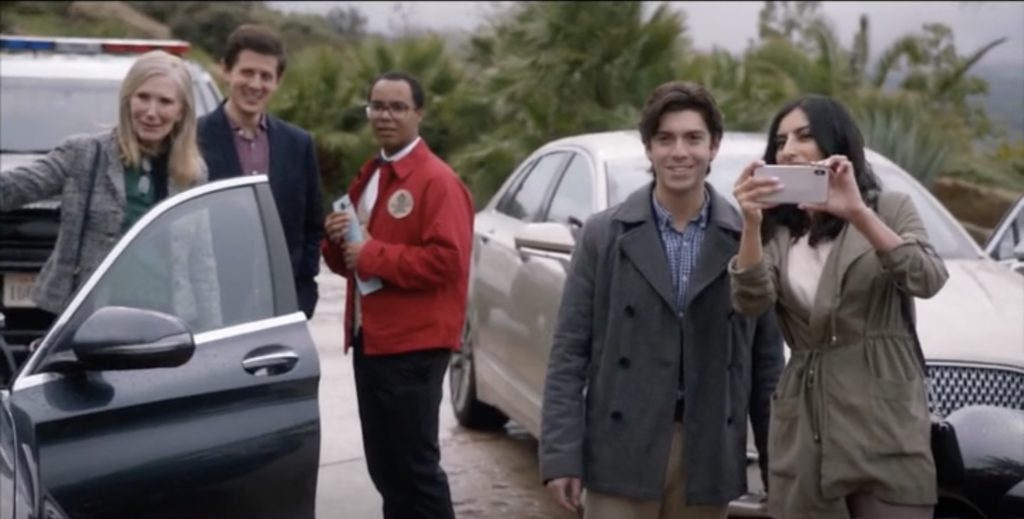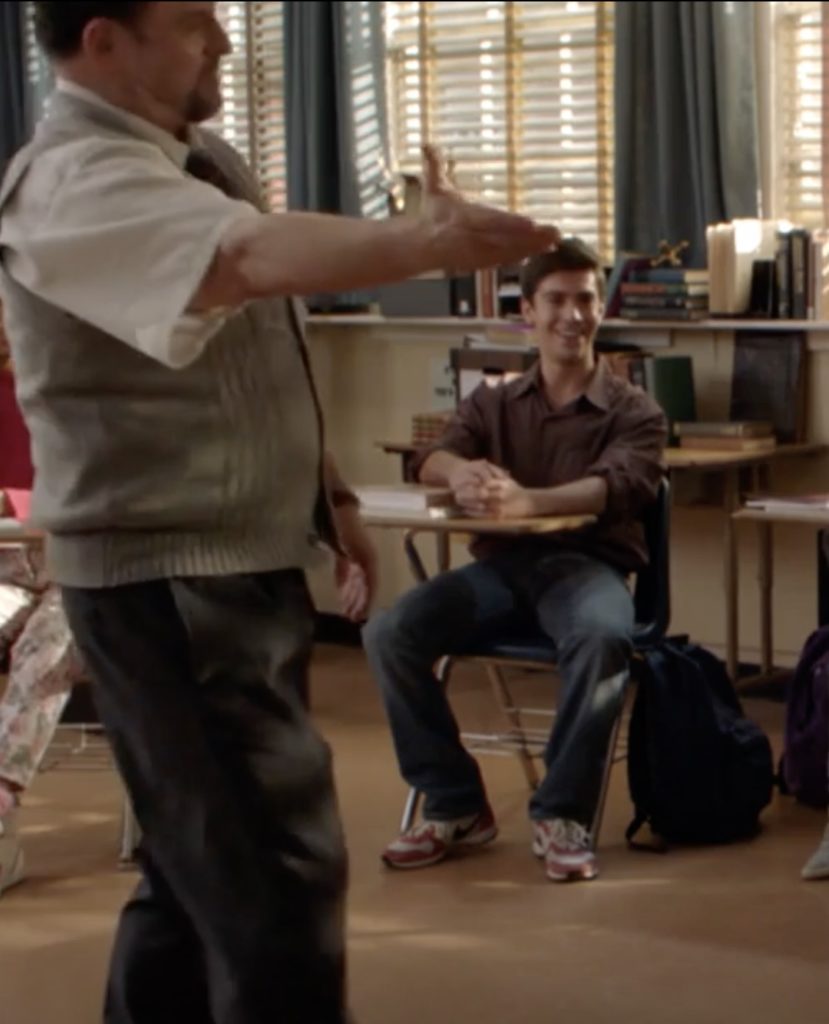By Jensen McKey and Haleigh Freeman
LOS ANGELES — David Prater is an actor.
But you’ll find him in the background.
He’s also a photo double and stand-in. You’ll see him in crowd scenes and in groups in movies and television. You might only see his back. You might only see his hands.
Or he could be in costume.
Sometimes you don’t know it’s him but he’s there.
Because David Prater is the guy in the background.
Yes, David Prater is a professional actor. He’s a member of the Screen Actors Guild, the actor’s union. But you probably won’t hear him speak.

A 2013 graduate of Enid High School, Prater earned a bachelor’s degree from Oklahoma State University. He spent one semester studying abroad near London. After returning to Oklahoma, he had a variety of jobs and a few small roles in state productions.
Though he began his career in Oklahoma, he soon realized the state’s film industry was not as developed as film industries in other parts of the nation. Prater knew if he wanted to make a living in the film industry he would have to go west – to California.
“I didn’t want to work in the oil industry,” he said. “For me, what I wanted to do for a career did not exist in Oklahoma and that’s fine because I knew that it did exist somewhere else.”
And while Oklahoma’s film industry continues to grow and expand – such as the work now being done on the film, Killers of the Flower Moon – the Oklahoma film industry isn’t as robust as that of California.
“Oklahoma is limited,” he said. “There’s not the scale or capacity of production work to make it a fulltime career.”
Still, there are benefits to working in the Sooner State. “Oklahoma does have very intimate sets,” he said. “They have a lot of moving parts that you can observe as a crash course in film making. It’s just finding where those are. It’s definitely beneficial.”
But for David Prater, the best place for his career was Los Angeles. It was there that Prater began seeking roles in earnest.
Once in California, his first stop was as a member of a studio audience.
Prater said that on many television shows with live audiences, the audiences are paid minimum wage “to sit in the audience to clap and hoot and holler and cheer on either the sitcom on the game show or the reality show or the talk show – whatever it is.”
Those audiences, he said, are largely not there because they want to be, but because they are being paid.
For Prater, audience work was the next step in his quickly evolving career. Through that, he met others who worked as background actors.
And it was at that point, he said, he found work that not only paid the bills but that he enjoyed doing.
As a background actor.
Considered an essential element in film and television background actors – also known as ‘extras’ – often portray crowds at sporting events, patients in hospitals and diners at restaurants. Background actors, the website Actingbiz.com says, are the soldiers on the battlefield, students in the school hallway and even the criminals in jail cells.
However regardless of the scene, location or time period, the actors are used play the role of background fillers.
“One important thing to note, by definition, extras never speak,” the website noted. “It’s an unspoken rule when an extra is asked to mouth a dialogue, even if it’s just one word, then the extra becomes an ‘actor.’
Still, like actors, background actors are members of the Screen Actors Guild and are almost always paid at union-negotiated levels, often around $100 to $200 per single day of work. For those with steady work in commercial spots, the pay can average $1000 per day – that doubles for weekend work.
Across the country, thousands of Americans work as background actors in film. In Los Angeles, alone, about 12,000 background actors are represented by the SAG.

Shortly after moving to LA, Prater began working with Central Casting, which has four offices across the country and casts roughly 80 percent of background actors. And he began to find roles.
Contrary to popular belief, he said, auditions for extras are very rarely in person. About 98 percent of casting is done through a third party. Prater said many companies use an email audition system. The company will post a casting call on a social media site, and if someone is interested, they could email a mugshot and their contact information.
“I answer lots of emails,” he said.
So far, he’s been successful.
Prater has worked on high profile television shows such as Young Sheldon and Disney’s The Mandalorian. He’s also been in The Superstore, the film Booksmart, SWAT and The Rookie.
Prater was also Tom Holland’s stand-in a Spider Man: Far from Home television commercial, with Donovan Mitchell, and Jake Gyllenhaal. Any scene that didn’t contain Holland’s face, was most likely Prater.
As a background actor, he’s played aliens – wearing a full body costume – who were usually dead or dying.
“It’s primarily what you think of as the atmosphere behind the scenes,” he said.
He’s also done work that is never shown on screen, playing a stand-in in for another actor for lighting and camera purposes.
“A stand is in someone who roughly the same dimensions as the actual actor,” he said “They (the production crew) don’t want to use the actor’s time or money so they hire a stand-in to stand where they will go.”
Because the time constraints for actors are tight, stand-ins and extras are often used to keep production moving and expenses under control. “It’s a good trade off,” he said.
Inspired by film and television at an early age, Prater said he and his father bonded watching Chuck Lorre sitcoms. From there, it was an easy step to work in the film and television industry.
“I had lots of inspiration,” he said. “But (film and television) was what really jived with my personality.”

Prater said one of his most enjoyable assignments was working with Tom Holland on a Spiderman commercial. “I really enjoyed that commercial and came totally out of the blue,” he said. “They called me the night before and said “you’re gonna be the one.” It was two days-worth of work.”
Along with standing in for a superhero, Prater has also played his share of dead bodies. During an episode of the television show SWAT, he said his character—a beach goer—was killed in an episode. “It was a scene where a drone comes all over the beach goes and blows up the place,” he said. “First, they use stunt people for the explosions and stuff, then then they bring us in and put our bodies in the same position.”
The key to playing a dead body, he said, is dying in a comfortable position.
“You don’t want to get stuck in an uncomfortable position that you can’t maintain for at least an hour,” he said.
Play a dead alien is also a great opportunity, he said, to catch a few winks.
And even though the role of an extra is never guaranteed and is expendable, Prater said the use of background actors for atmosphere makes a difference in many productions. “Laying down on the ground you can get really comfortable. After few minutes or so, you get relaxed. You just stay dead,” he said.
And on occasion, you get mistaken for a dummy. “It’s really bizarre but it’s lots of fun.”
For David Prater, a role in a television production as a background has helped him take steps toward his ultimate goal as an actor.
And while he’s not there yet, for right how he’s perfectly happy to stay in the background.

